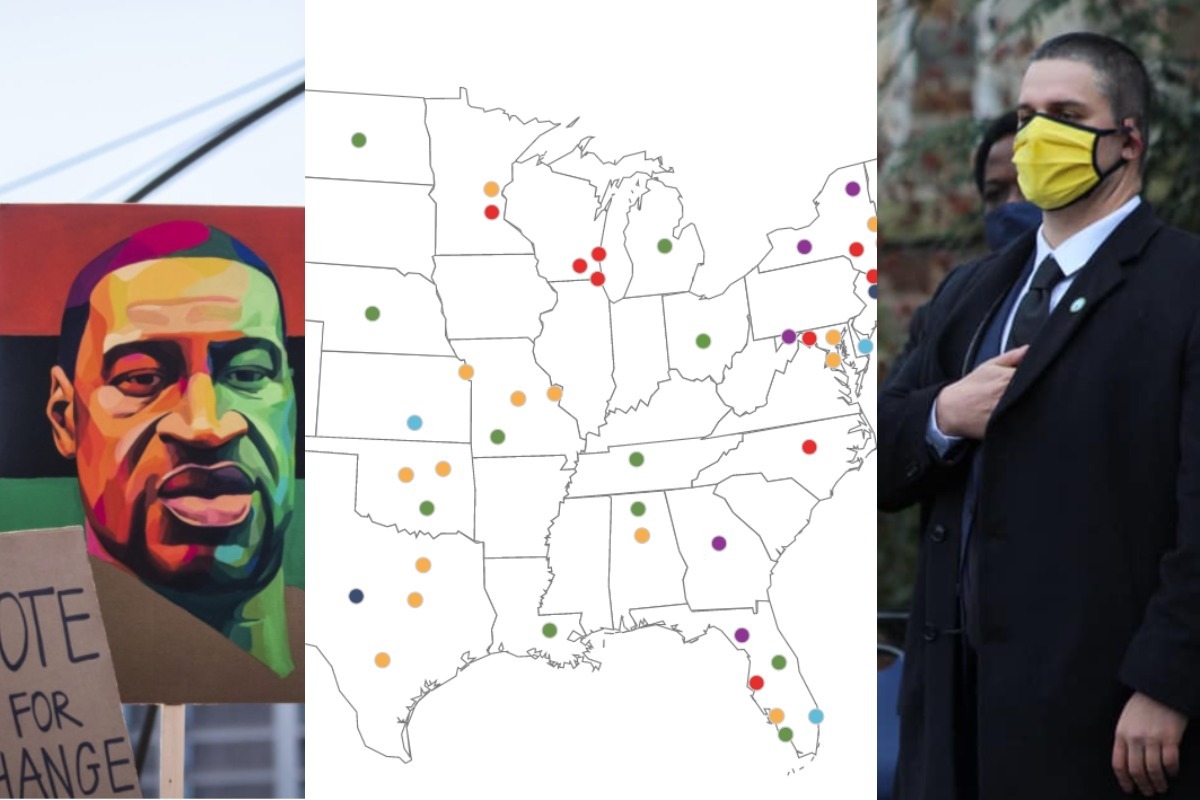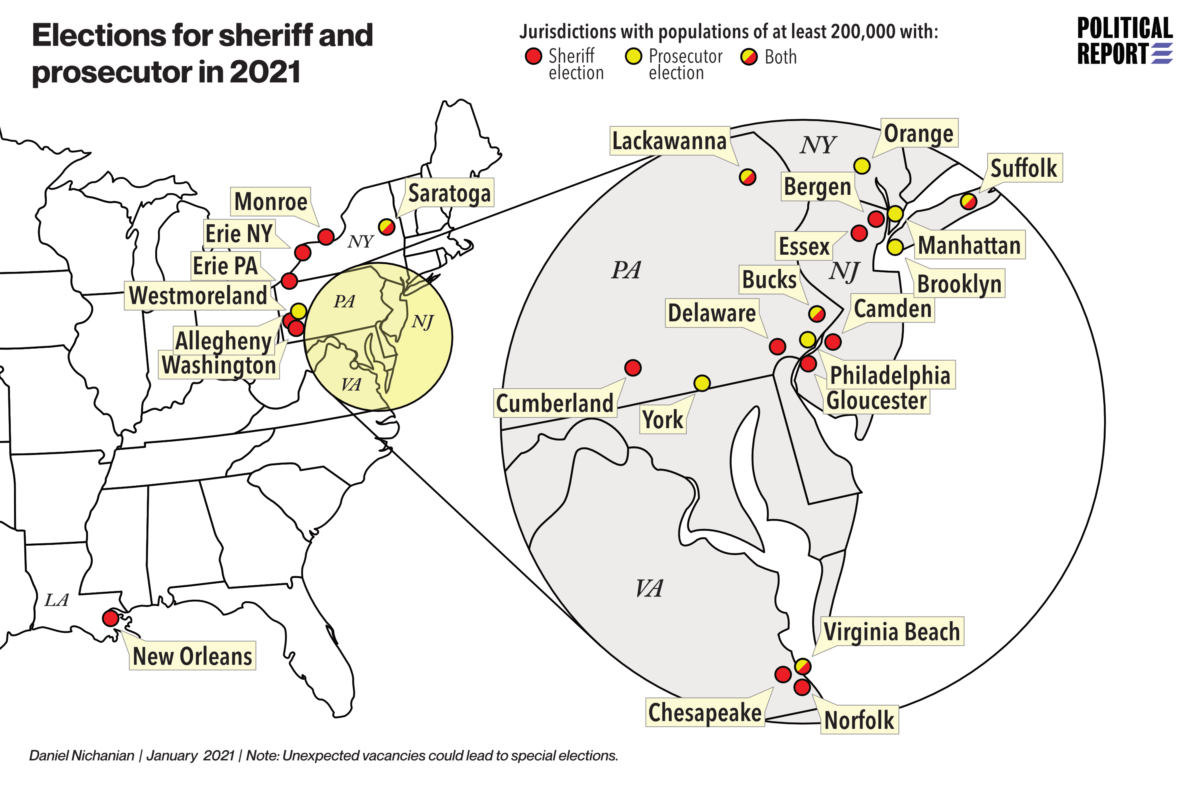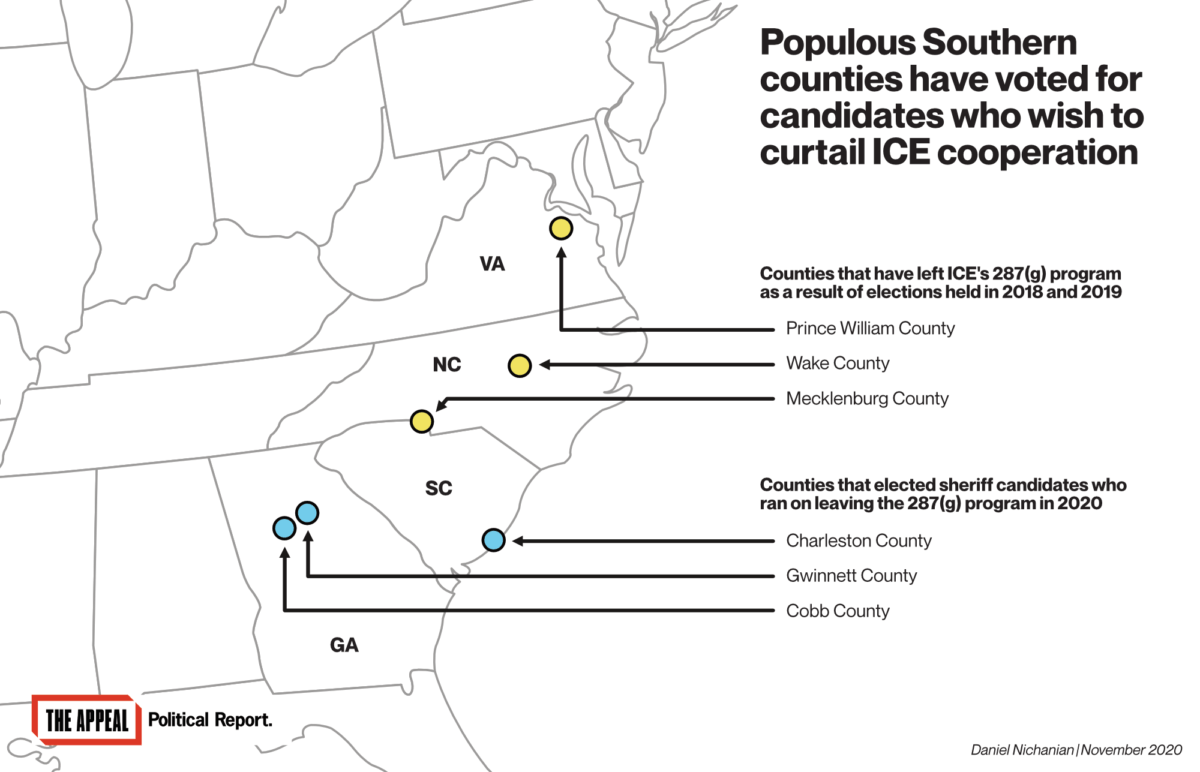D.C. Adopts a “Second Look” Law, and More Local Races Loom on 2021 Horizon
The Appeal: Political Report’s January 21 newsletter

The United States has a new president and a new majority in the U.S. Senate, and some rapid federal changes may be coming to immigration and judicial appointments. But in recent weeks I’ve also been chronicling the local and state momentum in favor of changing the criminal legal system and its many tentacles, and there was still more over the past week.
- Washington, D.C.: Mayor Bowser signs a “second look” law that may help shorten the sentences of some incarcerated people
- Illinois: Legislature passes a major reform package that touches on bail, felony murder, fines and fees, and more
- Virginia: Early success for legislation to abolish the death penalty
- Michigan: New prosecutor will stop prosecuting sex work
- Georgia: Cobb County’s new sheriff quits ICE’s 287(g) program, as he had promised
In case you missed it, catch up with the most recent Political Report newsletter, on major reforms in Georgia, Michigan, and Ohio. You can also visit our interactive tracker of legislative developments, our tracker of the politics of prosecutors, and our portal on 2020’s elections.
Raising the Curtain on the 2021 Elections
In 2020, progressives won prosecutor and sheriff elections across the Sun Belt, from Los Angeles to suburban Atlanta, and to a lesser degree the Midwest. The East Coast may take its turn in 2021. A string of local elections that hold the potential of upending the criminal legal system are on the horizon in the spring and fall.
Voters in Brooklyn, Manhattan, Philadelphia, numerous Virginia cities, as well as a medley of counties in Pennsylvania, New Jersey, and New York will elect their prosecutors and/or sheriffs, against the backdrop of sustained organizing and renewed protests. Three of these states also hold statewide elections that may alter the political landscape for criminal justice reform, and a string of municipal races nationwide will affect control over law enforcement.
As ever, local and state officials hold a huge share of the power to fight mass incarceration and wind down our punitive era. Even as Democrats are set to take control of the federal government this week, and some of their agenda involves changes to the criminal legal system, the politics of county prosecutors and sheriffs will have an outsized impact on issues such as sentencing and pretrial detention to drug policy, and plenty of activism will continue pressuring lawmakers, governors, and mayors to aggressively overhaul state rules and statutes.
Beyond the results of any individual race, though, 2021 may continue transforming the broader culture of criminal justice elections. In recent years, local candidates have laid out increasingly bold platforms, perhaps fueled by rising protests and by the previous wins of decarceral candidates whose successes called into question the electoral potency of tough-on-crime attacks. This has meant more proposals that would shrink criminal legal system and law enforcement altogether—by not prosecuting certain behaviors at all or by closing jails, for example—rather than just making them work differently. This shift is still nascent, however. Will the 2021 elections further it?
This week, I broke down some of the defining questions regarding local and state elections that will occupy our attention this year: How are the elections in Philadelphia and New York City shaping up? Which sheriffs are up for re-election after running jails with terrible conditions? How might the year alter Virginia’s balance of power? Read the full article for answers.

Washington, D.C.: Mayor signs a major “second look” legislation that may help shorten the sentences of some incarcerated people
Last week, Mayor Muriel Bowser signed the Second Look Amendment Act, an important reform in Washington, D.C., that would give hundreds of people who are serving very lengthy sentences a chance to be released earlier than scheduled. (Since D.C. is not a state, the bill will become law only after a statutory review period during which Congress is entitled to intervene to block it.)
Meg O’Connor reported on the bill in The Appeal in December, before the D.C. Council was set to vote on it. She explains that it builds on a 2016 reform that has allowed “people who committed serious crimes before their 18th birthday to petition the court for resentencing after they have served at least 15 years.” The Second Look Amendment Act would raise the cutoff age to 25, which would extend the eligibility to apply for a reduced sentence to at least 300 more incarcerated people.
O’Connor adds that the “Second Look Amendment Act is part of an emerging trend to extend youth resentencing measures to young adults,” as other states have adopted laws to either raise the age of juvenile jurisdiction higher than age 18 or to extend some provisions categorized as youth justice to ages 21 or 25.
The bill also furthers broader efforts to fight very long sentences that amount to life in prison, whether for youth specifically or for anyone.
“If we really are going to do anything about mass incarceration, decriminalizing marijuana isn’t going to do it,” Barbara Fedders, who directs the Youth Justice Clinic at the UNC School of Law, told O’Connor. “It’s going to be these sort of things—taking a second look at people who have been convicted of violent crimes.”
Illinois: Legislature passes a major reform package that touches on bail, felony murder, fines and fees, and more
The Illinois legislature last week adopted an omnibus bill years in the making that was championed by the Legislative Black Caucus. The bill, which now sits on Governor J.B. Pritzker’s desk, touches on many aspects of the criminal legal system. Here is an early selection of articles that delve into some of its core aspects.
Bail reform: “The legislation abolishes cash bail—a system that made avoiding pretrial detention contingent on an ability to pay—in all circumstances except when required by laws and agreements Illinois entered into with other states,” Elizabeth Weill-Greenberg writes in The Appeal. Advocates point to other provisions that would ensure pretrial detention decreases.
Felony murder: The omnibus bill would narrow the felony murder doctrine. “If passed, the bill will ban prosecutors from filing first-degree murder charges in cases where defendants did not commit the act or know it would occur, or where the death was caused by a third party,” Rita Oceguera writes in Injustice Watch. However, the bill would not bring relief to people already incarcerated because it would not apply retroactively.
Driver’s license suspensions: As momentum builds nationally against suspending driver’s licenses for a failure to pay court debt, the Illinois legislation would curtail though not eliminate the practice: If the bill is signed, people would no longer see their license suspended over unpaid red-light and speed camera tickets. The bill “would restore the driving privileges of some 11,000 people by July and eliminate a significant trigger for personal bankruptcies in Chicago,” Melissa Sanchez reports in ProPublica.
I will return to the legislation when the governor has acted on it.
Virginia: Early success for legislation to abolish the death penalty
Less than one year ago, legislation to abolish the death penalty in Virginia failed in the state Senate’s Judiciary Committee. The vote wasn’t even close.
On Monday, though, the same Judiciary Committee—with nearly the exact same composition—advanced a similar bill on a vote of 10-4.
All Democrats who are in the committee voted to advance the measure, as did one Republican (Bill Stanley). The most surprising vote is that of Majority Leader Dick Saslaw, a Democrat who has championed the death penalty for decades, including advocating for legislation in 2015 that would protect corporations that manufacture execution drugs from transparency laws. One factor that has changed since last year is that Governor Ralph Northam endorsed abolition this month; in addition, the Trump administration’s rush to kill people on the federal death row has galvanized more people to prioritize repealing the death penalty.
“Certainly, the recent string of executions brings added attention to the discussion,” Senator Jennifer Boysko, a Democrat who already long opposed the death penalty, told me this week. “And I’m glad that people are thinking about it and weighing it in their minds with some seriousness.”
Virginia, which is one of the states that has used the death penalty most aggressively since it was reinstated as a punishment in 1977, may be the likeliest state to abolish it this year. But the final votes on the floor of the Senate as well as in the House of Delegates remain uncertain.
Michigan: New prosecutor will stop prosecuting sex work
Eli Savit, the new prosecuting attorney in Washtenaw County (Ann Arbor), Michigan, announced last week that he would no longer prosecute acts involving consensusal sex work, including the soliciticition of a consensual exchange.
“The criminalization of sex work actually increases the risk of sex work-adjacent harm,” says the eight-page policy memo released by Savit’s office, comparing it to the effects of other “prohibitionist policies.”
The directive also states that criminalization “is in serious tension with established norms related to bodily autonomy and personal liberty.”
The decriminalization of sex work has become an insistant theme in district attorney elections over the past two years, but few prosecutors so far have announced formal policies of declining to prosecute. Chesa Boudin, the DA of San Francisco, announced last year he would not press charges for behaviors related to prostitution.
Savit, who won in 2020 on a progressive platform, has rolled out other reforms since he became prosecutor. On Jan. 4, he announced his office would no longer seek cash bail, as Rachel Cohen reported in the Political Report.
Georgia: Cobb County’s new sheriff quits ICE’s 287(g) program, as he had promised
Craig Owens, the new sheriff of Georgia’s Cobb County, a populous county in the Atlanta suburbs, terminated his county’s contract with ICE’s prized 287(g) program this week.
“Let me be clear: there’s a new day and a new era in Cobb County,” Owens said on Tuesday.
Owens, a Democrat, defeated longtime Republican Sheriff Neil Warren in November on a promise to end 287(g) and curtail broader cooperation with ICE, as we reported in September. At the time, he told the Political Report that the 287(g) program “often turns into profiling, looking at Africans, Latinos, Muslims, and other immigrants. It causes all types of problems, is expensive to maintain, and I don’t see why the county should be involved in it.”
The 287(g) program, which deputizes local law enforcement to act like federal immigration agents within jails and puts thousands of people each year on ICE’s radar, has been a longtime target of immigrants’ rights activists in Cobb County.
Two other populous Southern counties, Georgia’s Gwinnett and South Carolina’s Charleston, elected new sheriffs in November who earlier this month ended their own jurisdictions’ 287(g) contracts. (See the Jan. 7 newsletter.) “These incredible victories are the culmination of more than a decade of fighting back by immigrants’ rights organizers against the devastating 287(g) program which led to untold numbers of families being torn apart,” Azadeh Shahshahani, legal and advocacy director of Project South, told me in November when the election results first came in.
(It has since been reported that Butch Conway, who was just replaced as sheriff of Gwinnett County, attended the Jan. 6 Trump rally around the U.S. Capitol.)
The changes in Cobb, Gwinnett, and Charleston counties mirror what has occurred elsewhere in the South in recent years, as a wave of sheriffs have won after running against ICE cooperation.
It’s noteworthy that all three new sheriffs who ran and won in 2020 on a promise of ending the 287(g) contract have done so promptly after taking office because there has been some evidence since November that some local Democratic officials may use Joe Biden’s victory over Donald Trump in November as cover to continue helping ICE.

